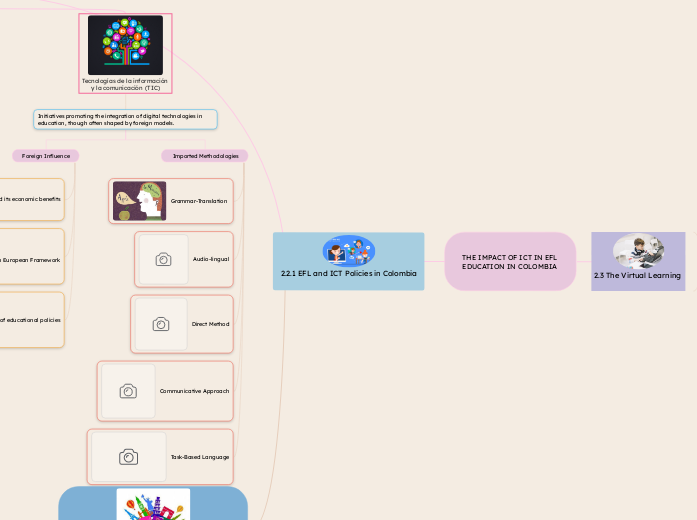"is classified into."
modalities
b- learning
blended learning
providing.
Wide range of solutions
Advantages
5. The feedback to students
4. The use of
different techniques with examples
3. Teachers’ accompaniment
with the students
2. Online teaching and tutoring.
1. Electronic study content designed for
self-paced.
e- learning
remote learning
They represent a challenge for communicative approaches (Le Gal, 2018).
They make task-based learning difficult.
Large classes of up to forty students in Colombian public schools.
Le Gal notices that policies created to improve the teaching of foreign languages.
The policies created by the Colombian government reflect the problems mentioned by these authors.
"Proyecto de Fortalecimiento del Desarrollo de
Competencias en Lenguas Extranjeras"
(PFDCLE)
This project was created in collaboration with the British Council.
Criticism of PFDCLE
Manufacturing consent (Valencia, 2013)
Lack of public consultation
Disconnection from local needs
Definition
Virtual Space
Impact of virtual learning
New perspectives for the education of new generations
the personalization of spaces
Considering interests and abilities.
Enhances various student abilities.
Promotes using diverse platforms and web apps to help students reach their goals.
Gives students access to
classmates all around the world
Visual literacy
Tools and concepts available to use.
a new way
of teaching and learning
The power and intelligence of new tools
Providing networking opportunities
The autonomy
determined by a space of reflection
Entails learning
A process that develops by mutual contract
Shared responsibility to ensure learning occurs.
Is a social
construction
through the use
Internet
Computers
Tablets
2.2.1 EFL and ICT Policies in Colombia
Has depended on foreign methodologies
(Le Gal 2018p.6) mentions how those policies have been tilted to the benefits of certain foreign individuals or companies
Foreign Influence
Adoption of the Common European Framework in Colombia
Not fully adapted to the Colombian context
Impact of ICT on EFL
Dominance of foreign methodologies
Economic and hegemonic focus
Importation of technology without didactic justification
Affecting the EFL process in Colombia
Future Teachers
Teachers
- Students
Homework-Based Learning. Le Gal (2018, p.5) states that learning and teaching have been successively adopted without any real contextualization:
Definitions
Tecnologías de la información y la comunicación (TIC)
Initiatives promoting the integration of digital technologies in education, though often shaped by foreign models.
Imported Methodologies
Task-Based Language
Communicative Approach
Direct Method
Audio-lingual
Grammar-Translation
Foreign Influence
Internationalization of educational policies
Adoption of the Common European Framework
British Council and its economic benefits
English as a Foreign Language
(EFL)
Government strategies aimed at improving English proficiency, often influenced by foreign methodologies and frameworks.
Identified Problems
Programs without prior evaluation
Overcrowded classrooms
Lack of adaptation to the Colombian context
Policies and Laws
Lack of contextualization
Foreign influence on methodologies
Implementation in favor of EFL
THE IMPACT OF ICT IN EFL EDUCATION IN COLOMBIA
2.3 The Virtual Learning

